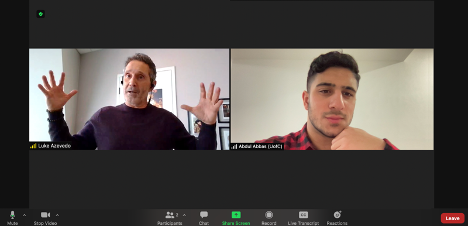
Is Calgary the next Canadian filming hub? Calgary’s film commissioner weighs in
By Abdul Abbas, April 17 2022—
Calgary’s footprint in the entertainment space has been growing exponentially and shows no signs of stopping. “Heartland (shot in Alberta) was the fifth-highest access point for Netflix, [It had] 20 billion views in 2021,” says Calgary’s Film Commissioner, Luke Azevedo, in a sit-down interview he and I had this past February.
Azevedo and his team are the ones responsible for bringing huge Hollywood productions and stars to our city and surrounding area, such as Dwyane “The Rock” Johnson for Jumanji 2, Paul Rudd for Ghostbusters: Afterlife, Pedro Pascal for The Last of Us (filming now), Leonardo DiCaprio for The Revenant, and much, much more. So, if you’re looking for someone to thank — or blame for the traffic downtown — Azevedo’s your guy.
Given how fast the film industry has been growing in Calgary, I felt it was important to unpack what this means for our city and what opportunities it may present for us as students and young Calgarians during our interview. To set a baseline, I asked Azevedo to describe to me what it is he and the film commission does.
“My job and our job here at the film commission starts before we know a project’s coming and lasts until the project has left,” he said. “There’s no value to a show coming here if you can’t make the things that they need to happen, happen. [The studios] come to us as the one-window access for all their needs as they move forward.”
To Azevedo’s team, this could mean getting approval to shut down the fourth avenue fly-over for a weekend to film, reviewing a film’s script to see if Calgary fits the film’s visual requirements or connecting the studios with local film unions to see if they have what it takes to bring their story to life.
Azevedo also mentioned that he can spend 50 per cent of his time traveling the world to sell Calgary and Alberta as a great place to film. He lists Los Angeles, New York, France, Berlin, India, and even China amongst a few other locations he’s visited to market our city.
This level of holistic support is uncommon, as many other cities can’t assist productions in the way Calgary does. This is because the City of Calgary has mandated the film industry as a “priority sector,” according to Azevedo, which gives the film commission the resources it needs to attract film productions to our city.
Oftentimes, Calgary’s success in the film industry is reduced to our beautiful views of the Rocky Mountains, which makes a great background for any shot, but Azevedo disagrees.

“You’ve got to be a location that has talent behind the camera,” he said. “You’ve got to have a location that is striving for diversity, equity and inclusion in your sector. You’ve got to be a location that has sound stages.”
Which Calgary has in spades, with three purpose-built film stages opening in the last few years. The Calgary Film Centre, Rocky Mountain Studios and Fortress Studios combined account for “well over half a million square feet” of filming space in the city.
However, none of this would matter if these productions didn’t provide financial profits to the city and province, which fortunately isn’t the case. Azevedo mentioned in an interview in January 2021 that the film industry was forecasted to generate $400 million of revenue for the Alberta economy in 2021. I asked him how close the province got to that dollar figure, now that 2021 is over.
“We went well over,” he said. “In Alberta, there was probably somewhere near $560 million [in revenue generated], in the Calgary jurisdiction, $520 million of that was done here.”
Azevedo elaborated on the effects of this industry around the country.
“In Canada, this is a significant impact industry. Creative industries represent 600,000 employees — film and television is 170,000 employees [nationwide]. So, this is not small potatoes,” he said. “We are an impact on the Canadian GDP. No question.”
I then asked Azevedo why there has been such a drastic spike in film productions coming to Calgary in recent years.
“The trigger point was the incentive,” he said.
A film tax incentive is an amount of money that a government rebates/returns to a film or TV studio for the taxes they paid during filming in that region (I speak more about the tax incentive in another article here).
“We’ve always been known for the quality of the work that we do. We’ve been known for our crews. We’re known for our talent in front of the camera. We’ve been known for our infrastructure. All those pieces were in place. So as soon as we triggered the incentive […] the world opened up. All of a sudden we became nationally and internationally competitive.”
We then directed the conversation towards how young professionals and students can break into the film industry.
“It’s all about talent. We want students coming out of post-secondaries […] that the film and television industry need, and we create a path for that.” Adjusting the local film industry into “a position where the students that are coming out of the [post-secondary] institutions have the opportunity to have access [to the industry].”
Azevedo went on to describe that the Film Commission, the unions, the provincial government and post-secondary institutes have collaboratively been focused on creating capacity for students from the University of Calgary and other schools to enter the industry with whatever degree they have — so long as it can be applied to the industry. Regardless if it’s a theory-based degree or a technical hands-on degree, it’s all applicable to this booming industry.
And if you’re thinking of getting into film, now is the time – as Calgary was ranked the 10th best city in North America to work in film. And Azevedo echoes the same sentiment.
“We’re starting to be seen as a location of choice and being on the A-list. We are a topic of conversation in Los Angeles and in many parts of the world, and now we get calls from everywhere.”
At a time when young professionals are leaving the city more than ever in pursuit of better career prospects, it’s interesting to note that an industry that people don’t usually associate with Calgary is booming with opportunity. Given that the film industry requires talent from a wide range of disciplines — from electrical work to financial accounting — it’s very likely you’ll find an opportunity that fits your career path.
But don’t take it from me, take it from the commissioner himself.
“The production world is watching us,” he says.
